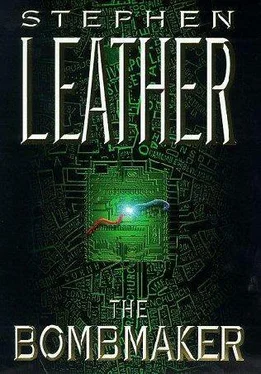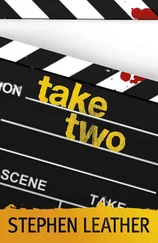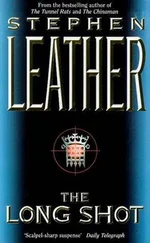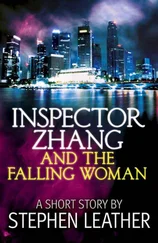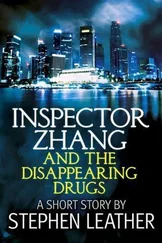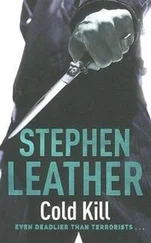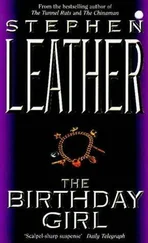Stephen Leather - The Bombmaker
Здесь есть возможность читать онлайн «Stephen Leather - The Bombmaker» весь текст электронной книги совершенно бесплатно (целиком полную версию без сокращений). В некоторых случаях можно слушать аудио, скачать через торрент в формате fb2 и присутствует краткое содержание. Жанр: Триллер, на английском языке. Описание произведения, (предисловие) а так же отзывы посетителей доступны на портале библиотеки ЛибКат.
- Название:The Bombmaker
- Автор:
- Жанр:
- Год:неизвестен
- ISBN:нет данных
- Рейтинг книги:5 / 5. Голосов: 1
-
Избранное:Добавить в избранное
- Отзывы:
-
Ваша оценка:
- 100
- 1
- 2
- 3
- 4
- 5
The Bombmaker: краткое содержание, описание и аннотация
Предлагаем к чтению аннотацию, описание, краткое содержание или предисловие (зависит от того, что написал сам автор книги «The Bombmaker»). Если вы не нашли необходимую информацию о книге — напишите в комментариях, мы постараемся отыскать её.
The Bombmaker — читать онлайн бесплатно полную книгу (весь текст) целиком
Ниже представлен текст книги, разбитый по страницам. Система сохранения места последней прочитанной страницы, позволяет с удобством читать онлайн бесплатно книгу «The Bombmaker», без необходимости каждый раз заново искать на чём Вы остановились. Поставьте закладку, и сможете в любой момент перейти на страницу, на которой закончили чтение.
Интервал:
Закладка:
'Nothing could ever be proved.'
'Bastard.'
'Yeah. His daughter helps him run it. Kerry. She's thirty-two.'
'Any IRA involvement?'
'Periphery, so far as we know.'
Denham shrugged his shoulders. He was tired and could have done with a few hours' sleep, but there was no time. He closed his eyes.
'Sir?' McKechnie's voice jarred him awake.
'Huh?'
McKechnie grinned across at him. 'Your cigarette, sir.'
Denham looked at his right hand. The cigarette had almost burned down to his fingers and he realised that he must have fallen asleep. 'Wasn't snoring, was I?' he asked. McKechnie shook his head but didn't say anything. Denham stubbed his cigarette butt into an ashtray that was already filled to overflowing.
The drive to Thurso took the best part of half an hour, then McKechnie turned off the A882 and headed east. After another ten minutes he turned on to a single-track road and slowed the Volvo down to a walking pace. 'That's it, up ahead,' he said. Denham was impressed by McKechnie. He appeared casual, dishevelled even, but he was well briefed on Geraghty, and though there was a map open on the back seat he hadn't had to look at it.
The headlights illuminated Garryowen Farm, a two-storey grey stone building with a steeply sloping slate roof. There were no lights on. McKechnie stopped the car and tapped his fingers on the steering wheel. 'Shit,' he said.
'Let's have a look around the back,' said Denham.
McKechnie drove slowly past the farmhouse. Behind it was a large stone barn which had been converted into flats with individual entrances, and a short row of cottages. They were all in darkness.
The two men climbed out of the Volvo and walked towards the rear of the farmhouse. McKechnie had left the headlights on, and they cast giant shadows as they approached a black-painted wooden door. Denham knocked on it several times. McKechnie stood back to check if a light went on upstairs, but he shook his head. Next to the door was a large sash window. Denham put his hand against the glass and peered inside. It was the kitchen, and there were no signs of life. No dirty dishes in the sink, nothing on the draining board, and a potted plant on the windowsill was wilting and clearly hadn't been watered for days.
McKechnie bent down and examined the lock on the kitchen door. 'Mortice,' he said.
'Part of your training, I thought,' said Denham, walking up behind him.
'It is,' said McKechnie, straightening up. He looked around the garden. 'But mortice locks are buggers without the right equipment.'
'And you haven't…'
'Afraid not. I wasn't planning on any breaking and entering.'
Denham looked up at the top floor of the building. 'I didn't see any alarm at the front, did you?'
'No point, this far away from the neighbours. And the nearest cops must be in Thurso.' He went over to a tool-shed and examined the padlock on its door. 'This is more like it,' he said. He knelt down, took a small leather wallet from the pocket of his sheepskin jacket and worked on the lock with two small strips of metal. He had it open within thirty seconds and pulled open the door. He went inside and reappeared with a large spade. He grinned at Denham as he went over to the sash window and inserted the end of the blade into the gap between the window and the frame. He pushed down on the handle of the spade with all his weight and the window lock splintered.
'You learnt that with Five?' asked Denham wryly.
'Misspent youth,' said McKechnie, leaning the spade against the wall and pushing the window open. 'Boarding school mainly.' He put a foot against the spade handle and heaved himself into the kitchen, head first. Denham was just about to follow when McKechnie called out that the key was on the inside of the door. A few seconds later the kitchen light flickered on, the door opened and McKechnie waved Denham inside. They went through to a wood-panelled hallway. There was an untidy pile of mail in front of the letterbox.
'You check the bedrooms,' said Denham. He pushed open a door as McKechnie went upstairs and flicked on the light. It was a study – floor-to-ceiling bookshelves lined one wall; the others were wood-panelled with several framed prints of hunting dogs. The furniture was sturdy and worn, comfortable leather chairs with sagging cushions and a large desk with a brass reading lamp. Denham sat down at the desk and pulled open the top drawer. It was filled with papers and Denham took them out. He flicked through them. The most recent was three months ago, a letter from a bank to Geraghty, asking him to telephone the manager about his overdraft. There were several bank statements, three different banks in all, and they were all in the red. Several thousand pounds in the red.
He found a brochure advertising Geraghty's company complete with glossy photographs of smiling executives climbing, abseiling, canoeing and sailing. There was a photograph of a man in his fifties, grey-haired and tough-looking with a nose that had obviously been broken several times. It was Micky Geraghty. Denham pulled the drawer all the way out. At the back was an Irish passport. Inside was a photograph of a slightly younger Geraghty. Denham riffled through the pages of the passport and found two entry stamps for the United States, both from the early nineties. There was a visa for Australia for the previous year. According to the stamps on the opposite page, Geraghty had spent three months there.
He found a diary in the second drawer of the desk, a big leather-bound volume, with each week running across two pages. Geraghty had used it to record the courses he ran. The last entry was for five months earlier. Two entries before that had been crossed out. From the looks of the diary, business hadn't been good for a long time. Underneath the diary were several letters from companies cancelling their courses, most of them blaming the recession.
Denham could hear McKechnie moving around from room to room upstairs. He pulled open the third drawer. It was full of letters and photographs. Letters from Geraghty's daughter, and photographs of a young woman with a man and two small children. Denham flicked through the letters. Kerry Geraghty had moved to Australia and was now living in Brisbane with her husband. She was pretty, with long chestnut hair and laughing blue eyes.
McKechnie came downstairs and Denham heard him picking up the mail by the front door. Denham twisted around in the chair to look at him as he walked into the study.
'I thought you said the daughter helped him run this place?'
'That's what the file says.'
'She emigrated. A couple of years back by the look of it.'
McKechnie looked pained. 'What can I say? The file's obviously out of date. I guess the Geraghtys weren't considered a high priority.' He dropped the letters on the desk. 'Mail's been piling up for three months,' he said. 'No empty hangers in the wardrobes, toothbrush is in the bathroom, and there's an empty suitcase in the boxroom.'
Denham held up the passport. McKechnie exhaled through pursed lips. 'What do you think?'
'I think we should give the house a good going over. Just in case. Top to bottom. The works.' He pushed himself up out of the chair. At the kitchen end of the hall was a door under the stairs, and Denham tried to open it. It was locked. He turned to look at McKechnie. 'Think your misspent youth can deal with this?'
McKechnie grinned and knelt down by the lock. 'Piece of cake,' he said. He went back outside and returned with the spade, inserted it into the side of the door and pushed against the handle with all his weight. The wood splintered and McKechnie pulled back the door and leant the spade against the wall.
Denham wrinkled his nose. A sickly-sweet smell wafted up from the basement below. He took a handkerchief from his trouser pocket and held it to his face as he groped along the wall for a light switch. He found it and flicked it on. The smell hit McKechnie and he grunted. He went through to the kitchen, took a towel and held it under a running tap for a few seconds before holding it over his mouth and nose and following Denham down into the basement.
Читать дальшеИнтервал:
Закладка:
Похожие книги на «The Bombmaker»
Представляем Вашему вниманию похожие книги на «The Bombmaker» списком для выбора. Мы отобрали схожую по названию и смыслу литературу в надежде предоставить читателям больше вариантов отыскать новые, интересные, ещё непрочитанные произведения.
Обсуждение, отзывы о книге «The Bombmaker» и просто собственные мнения читателей. Оставьте ваши комментарии, напишите, что Вы думаете о произведении, его смысле или главных героях. Укажите что конкретно понравилось, а что нет, и почему Вы так считаете.
